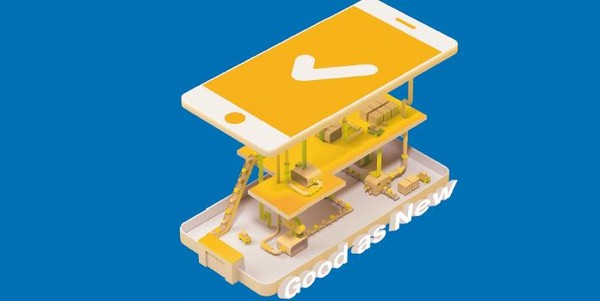
Trading used items and purchasing necessary items at a low price is booming in Korea! The biggest reason why the used trading market has become active is due to the prolonged COVID-19 epidemic. Consumer sentiment has shrunk due to the economic downturn caused by the pandemic, and consumption trends have also changed.
According to the recent consumer price trend released by Statistics Korea, the consumer price growth has exceeded 2% for the past six months. As prices soared, and a desire to purchase products at a more reasonable price has increased, the used trading market in various fields has taken off, partly due to a positive perception of used products. So, how are consumers using mobile trading platforms? Examining the number of installers in September compared to January 2021, increased by 22.9% for ‘Daangn Market’, 20.8% for ‘Bungae Jangteo’, and 7.8% for ‘Joonggonara’.
- Reason for the Increase in Second-hand Trading
The MZ generation (which refers to millennial and Gen Z combined) was born in a rich era and experienced various things. It seems this generation also considers second-hand trading as consumption that provides for a fun experience. Additionally, there has also been a shift in shopping trends, from seeking out ‘new’ bargains, to seeking out ‘used’ products and hidden gems.
And through this experience, consumers sometimes discover their ‘competence’ as shoppers.
The growth of various used trading platforms has led to the popularity of ‘re-sell’ investment. Re-sell investment refers to the purchase of limited or event-oriented products with a high scarcity, and then re-selling them at a premium. It seems to be the MZ generation that leads the re-sell investment.

So, let’s take a brief look at the experiences of some second-hand traders.
- “I had some used clothes. The condition was okay, but I decided to sell it because I don't wear them often. Fortunately, someone from the Internet said he liked the clothes very much and wanted to buy them. I was proud to think that second-hand trading has a positive impact on recycling resources.”
- “I went to the seller's house, which was the pre-arranged place of a second-hand trading place. However, the person who welcomed me was the seller's mother. I would have been less irritated at the situation had the condition of the product been normal, but it was a thorough mess! And then the seller's mother still insisted that this price was cheap, so I was in an awkward situation. It felt like just a big waste of my time and transportation-fees.”
- “Recently, I purchased a tablet PC from the second-hand trading platform, Daangn Market. While I turned on tested it before buying it, I later learned the product was a bricked-tablet; it would only boot in a limited mode.”
- “The buyer and I lived far apart. It was about a thirty minute journey by bus. The buyer said he was a student and wanted to do the purchase before class, so he said he would come to my neighborhood early in the morning. I set a date and time for the appointment, but when I asked, ‘Are we still meeting this morning?’ there was no answer. That night, the buyer said he was sorry that he forgot and asked me if it was okay to do the purchase the following morning. Eventually, I sold the item, but it was a disappointing exchange because the buyer did not consider my circumstances.”
- The Fraudulent Methods of Second-hand Trading
Another issue to consider is fraud-related crime, which is also on the rise. There are many criminal methods, and as the number of cases increase, the scamming methods are becoming more sophisticated.
For example, due to COVID-19, the sales method known as ‘doorknob trading’ has increased. Doorknob trading is a method of hanging an item that is supposed to be sold on the doorknob of one’s house and conducting a non-face-to-face transaction. This however allows crooks to take the item, without paying for it, taking advantage of the fact that sellers can’t always check outside their house. Platforms such as Daangn Market also make it difficult to report fraud because there is limited information about users.
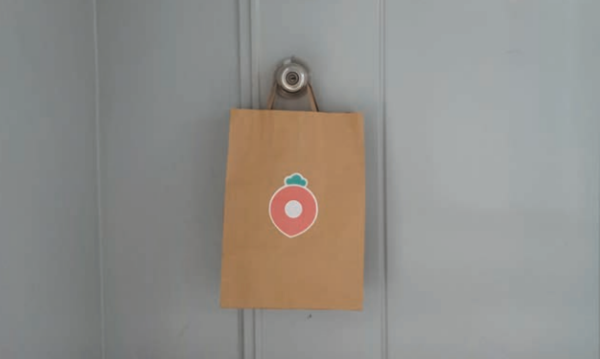
The other problem is the risk of personal information safety. Have you ever heard that your account is being used as a means to commit crime? The supposed “buyer” for instance deposits much more money than the price of the item, but then politely asks for you to send it back, as they mistook the payment. In the process, your account is used as an intermediary-delivery-account. That is, criminals send money through your account because they can easily be caught if they send “dirty money” directly. Your account was used as a means of crime without you even knowing it!
- Precautions for Second-hand Trading
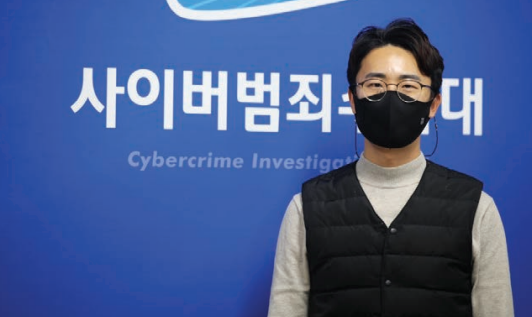
Then, how do we prevent crimes that occur in the second-hand trading market? The JBNU Globe asked a cyber-investigator at Jeonbuk Provincial Police Agency, Choi Hyun-tai. He had the following things to say.
If second-hand sellers are determined to commit fraud, it is not easy to grasp their intentions. Thus, we had better collect a lot of information about the seller in the first place, just in case. At least you should know the seller’s ID and account information.
For online trading, it is very important to confirm the seller’s information because there is limited information in the first place. There is a website and app called ‘The Cheat’ that shares fraudulent accounts and phone numbers. It is not made by the police, but it has helped us. It is a site operated to prevent fraud. Therefore, to prevent issues from arising before engaging in a sale, it is useful to use this website to check whether any information exists about the seller engaging in fraudulent activities.
Similarly, it is also important to carefully examine the products you want to purchase. Before purchasing, you should have a thorough conversation about the item and check the photos carefully. This is because sellers usually claim to have posted the photos “as is” and therefore can blame the buyer. It is better to ask careful questions before making a purchase, and then keep the conversation as evidence thereof.
In the case of in-person transactions, it is important to conduct it in a safe place. It is better to be skeptical and careful when there are few people around. Ideally, a safe meeting place should be set, such as in front of a public office, where there are surveillance cameras, or where many people pass by. Carefully selecting the site can be an important precautionary measure. Moreover, you can respond and quickly get assistance if a crime does occur.
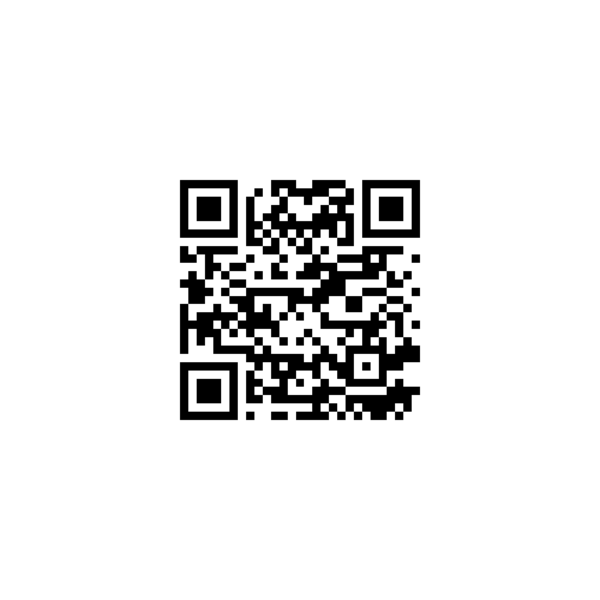
However, if you’ve already been scammed, what should you do? There are a number of ways to report it online and you can visit a police station in-person. You can electronically document the contents of your conversation and sales-transfer as evidence and then report it according to a police report form. During this stage, the details of the sales-transfer would be considered the most important piece of evidence.
Then, as the region of the seller and buyer may be different, or the money may have been deposited through several bank accounts, it can take some time to investigate it properly.
From now on, let’s take a look at the various platforms for second-hand trading, and find the perfect one that matches your needs!
- Joongna (Joonggonara)

Joongna is the oldest and the biggest second-hand market platform in the country. It was established in 2003, and there are more than eighteen million members. Joongna is easy to approach, because there is not any complicated joining process. All you need is a Naver account, which almost every Korean person has. However, some of the users still spam the platform, which can make it difficult for the potential buyers to find the information they want.
- Bunjang (Bungae Jangteo)

Bunjang is also one of the more established second-hand trading platforms. The biggest advantage of Bunjang is that it has its own safe transaction system; ‘Bungae pay’. If you use Bungae pay, Bunjang holds the buyer’s money until the seller sends the item to the buyer. When the buyer confirms that they have received the item safely, Bunjang then transfers the money to the seller. Also, Bunjang has partnered up with many convenience stores throughout Korea. This makes it easier to conduct trades with the convenience store parcel-delivery service.
- Daangn Market
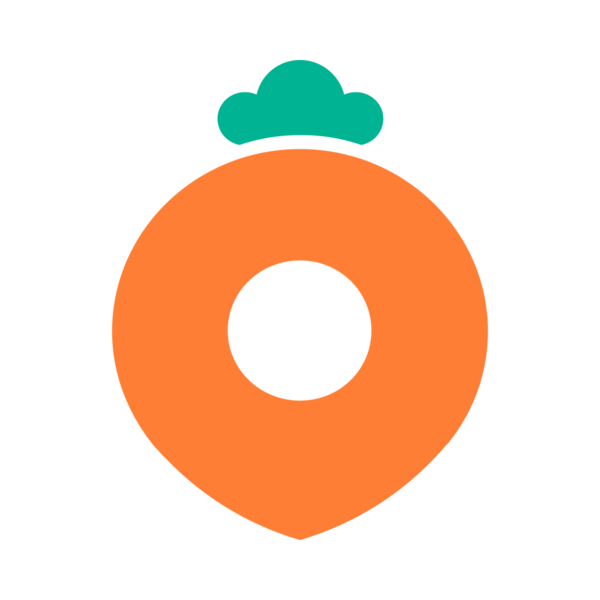
Daangn Market is a second-hand market application based on the users’ living area. With this app, you can only trade with people living within a 6km radius. You are less likely to be scammed on Daangn Market since most of the trades are done hand-to-hand. Also, there is a system called ‘manner temperature’ on Daangn Market. If someone behaves rudely or does not keep a promise when trading, their manner temperature will fall and they will be penalized in some way. Also, you don’t have to expose your personal information to strangers; you can talk with the seller/buyer by ‘Daangn chatting’, the original chatting system of Daangn Market.
- Everytime

Everytime is not exactly a platform for second-hand trading; it is a community service for university students around the country. However, due to the characteristic that you can easily contact fellow students of the same university, many university students use this platform to trade used goods, such as textbooks. There is even a bulletin board system just for trading used books on Everytime. You can easily find cheap used textbooks for mandatory liberal arts courses here.
- Checklist for Second-hand Trading Etiquettes
I am a seller!
- I used my own photos to write the sales post.
- I wrote a detailed description about the item for sale, including any major defects.
- I checked the current market price and set the item at a fair price.
- I changed my listing to ‘booked’ right after I had made an appointment with a buyer.
- I took good care of the item for sale before passing it over to the buyer.
I am a buyer!
- I thought carefully about the purchase, and clearly made up my mind before making an appointment with the seller.
- I read the description on the sales post carefully before asking questions to the seller.
- I respected the seller’s wishes and tried not to bargain on the price too much.
Warning!
- Never ‘ghost on’ each other before the trading ends completely.
- Don’t forget to wrap up the conversation with a warm thank-you message, and avoid using rude words in any circumstances.
- Chatting late at night can be burdensome. Try not to make contact at odd hours of the day.
- Trading Spots around JBNU
Then, where should we meet to safely buy and sell used goods around JBNU? The JBNU Globe has looked around the campus and its surrounding areas to find the perfect spot for you. These spots are selected under these criteria: 1. Are there many people passing by? 2. Is there a public office nearby? And if not, 3. Are there a number of surveillance cameras around?
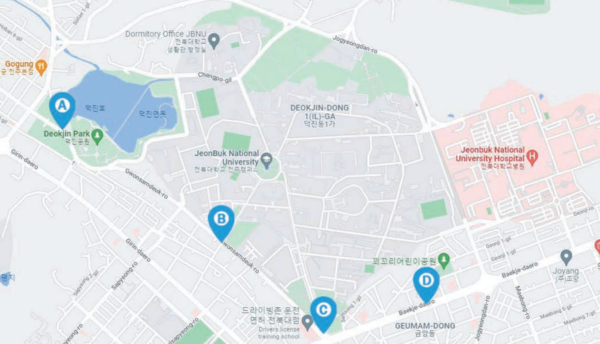

In summary, online second-hand trading platforms are excellent services that connect people to people. The trader should consider many things such as the product condition and shipping management. Sometimes unintended difficulties can occur, and these can be frustrating, or even embarrassing! The JBNU Globe hopes that both buyers and sellers will develop to create a more mature second-hand trading culture in the future.
| Kim Eun-ji Editor-in-chief, Han Hee-jeong Editor, Park Ji-woo Reporter

